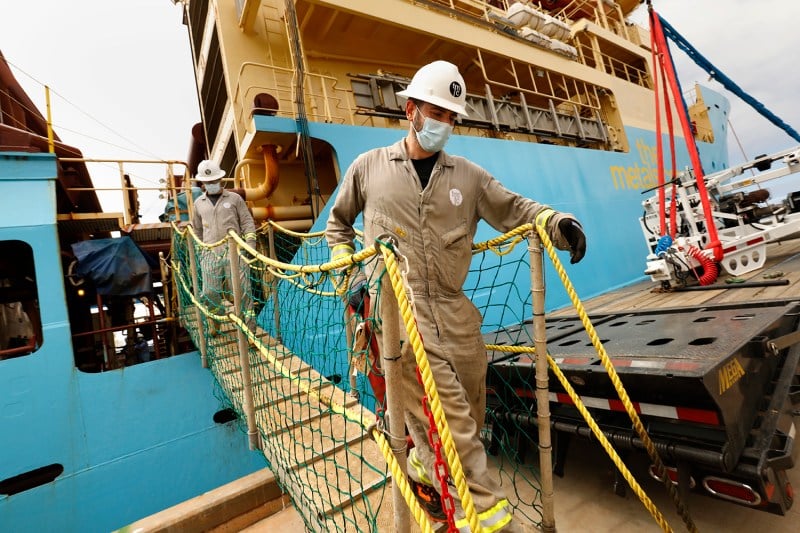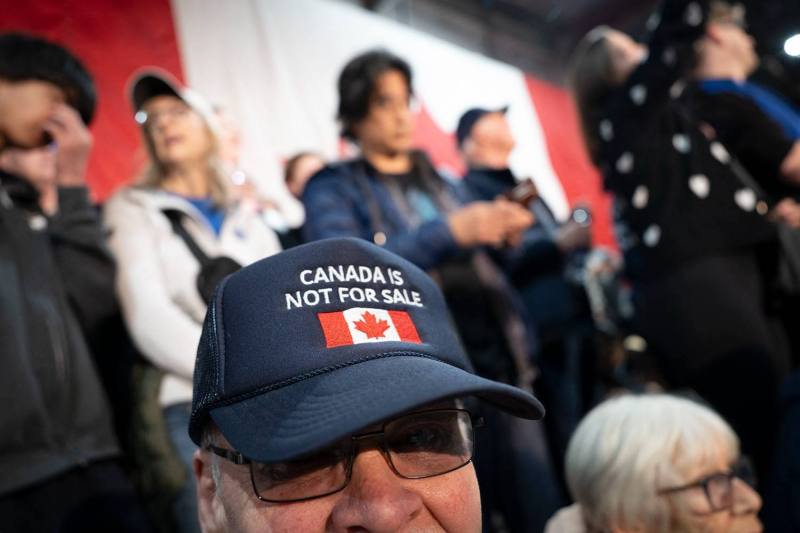Trump’s Brazen Push to Mine the Ocean Floor

Trump’s Brazen Push to Mine the Ocean Floor
The U.S. leader could pave the way for a gold rush in international waters.
Workers disembark from a research vessel in San Diego in June 2021. The vessel was studying the effects of deep-sea mining on sea life in the Pacific Ocean’s Clarion-Clipperton Zone. Carolyn Cole/Los Angeles Times via Getty Images
U.S. President Donald Trump has officially jump-started U.S. efforts to mine the seafloor, pitching the United States into the center of a contentious debate that has sparked fears of a race to the bottom in the world’s last untouched frontier.
Trump last week signed an executive order that would fast-track efforts to exploit key minerals in both national and international waters, citing the defense of a “core national security and economic interest.” The explicitly named threat is China, which dominates many of the world’s critical mineral supply chains and has used that leverage to strike back against the Trump administration’s trade war.
U.S. President Donald Trump has officially jump-started U.S. efforts to mine the seafloor, pitching the United States into the center of a contentious debate that has sparked fears of a race to the bottom in the world’s last untouched frontier.
Trump last week signed an executive order that would fast-track efforts to exploit key minerals in both national and international waters, citing the defense of a “core national security and economic interest.” The explicitly named threat is China, which dominates many of the world’s critical mineral supply chains and has used that leverage to strike back against the Trump administration’s trade war.
“We are heading toward a metal crisis right now with the trade issues with China,” said Alex Gilbert, the vice president of regulation at Zeno Power and a fellow at the Colorado School of Mines’ Payne Institute for Public Policy. Trump administration officials “see that deep-sea minerals are an area where they can potentially compete.”
With this executive order, Trump is embracing a nascent industry that has engendered fierce clashes among mining companies, countries, scientists, and environmentalists. The Trump administration’s move amounts to a sharp break in U.S. policy that is certain to intensify legal, environmental, and financial uncertainties, all of which were already clouding the future of the industry.
“Deep-sea mining is a polarizing matter, and part of it is because we don’t really have a deep understanding of the environmental impact,” said Gracelin Baskaran, a critical minerals security expert at the Center for Strategic and International Studies (CSIS).
Thousands of feet below the ocean’s surface, mineral riches beckon. The treasures that Trump has set his sights on are deposits known as polymetallic nodules, which are rich in nickel, cobalt, copper, and manganese and formed over millions of years. Mining companies and some countries have long been eager to tap those minerals, which power the technologies underpinning modern society and are set to face explosive demand in the coming decades. But key hurdles have stood in the way.
First, there’s the environmental resistance. Opponents of the potential industry warn that too little is known about how commercial mining operations could impact sea life at those depths. More than 900 scientists have called for a pause, citing a “paucity of rigorous scientific information,” and at least 32 countries have backed a moratorium, precautionary pause, or outright ban.
No country has ever commercially mined in international waters, thanks to a decades-old treaty that nearly 170 states have ratified. Under that agreement, known as the United Nations Convention on the Law of the Sea (UNCLOS), mining there is prohibited until a U.N.-affiliated agency, called the International Seabed Authority (ISA), finalizes the rulebook for the sector. The ISA is still negotiating that mining code, a process that has now taken more than a decade and would set the framework for governance and regulation.
Washington never ratified the treaty because it didn’t want to face any mining restrictions. As the only major coastal nation to shun the agreement, the United States has largely stood on the sidelines of international negotiations. Eager to change that, in 2024, hundreds of former U.S. military and political leaders—including former U.S. Secretary of State Hillary Clinton—wrote a letter urging Senate leaders to ratify UNCLOS.
But Trump is shifting strategies entirely. He now appears to be trying to completely bypass UNCLOS, pitching both Washington and the ISA into uncharted territory. The Trump administration will harness a 1980 law called the Deep Seabed Hard Mineral Resources Act to mine seabed territory beyond its national jurisdiction, the executive order said.
Trump’s executive order was rebuked by the ISA, which stressed in a statement that UNCLOS aims to ensure the deep seabed “is governed collectively, not dominated by those with the greatest financial or technological advantage.” While Washington has not ratified UNCLOS, it recognizes the treaty as “reflecting customary international law,” which is binding for all states, the ISA said.
“If powerful States or corporations attempt to bypass the international legal framework established by UNCLOS, they risk undermining its very foundation: preventing unilateral actions that privilege the interests of the few at the expense of the many,” the ISA said.
“The decision by the United States to unilaterally pursue deep-sea mining is a breach of international law with dire consequences for every country and person who benefits from the ocean as our common heritage,” Duncan Currie, a legal advisor to the Deep Sea Conservation Coalition (DSCC), an alliance of more than 130 nongovernmental organizations, said in a statement. “It upends more than 40 years of legal precedent in the U.N. Convention on the Law of the Sea.”
Yet challenges loom. Even if companies do descend on the seafloor, it’s not clear if commercial mining operations make economic sense. Commodity prices are known for whipsawing—volatility that injects immense risk into any mining bid, let alone ones that are underwater.
One big question is: “Are they actually gonna make money doing it?” said Tom LaTourrette, a senior physical scientist at RAND. Nickel and cobalt prices have been tanking, he said, and an increased mineral supply would only drive prices down even more.
Trump’s executive order drew fanfare from the Metals Company (TMC), a Canadian firm that has been one of the most forceful proponents of deep-sea mining. Tired of waiting for the ISA to finalize regulations, TMC has sought the Trump administration’s support, announcing last month that it would apply for mining licenses and permits under U.S. law.
The “Executive Order marks America’s return to leadership in deep seabed minerals,” TMC CEO Gerard Barron said in a statement. “With a stable, transparent, and enforceable regulatory pathway available under existing U.S. law, we look forward to delivering the world’s first commercial nodule project—responsibly and economically.”
The Trump administration’s deep-sea mining ambitions should be seen as just one part of its broader effort to boost U.S. critical minerals security, all of which has only been turbocharged by the trade war with Beijing. Beyond the seas, Trump’s bid to secure new mineral supplies has also seen his administration make an enemy of Canada, antagonize an entire island of Greenlanders, and ogle longtime ally Ukraine’s purported riches.
“This is the administration being very strategic about where the principal areas of vulnerability are” regarding China, said Alexander Gray, a former chief of staff on the first Trump administration’s National Security Council.
China—which has its own deep-sea mining ambitions and has sought to position itself for success in the nascent industry—was, unsurprisingly, critical of Trump’s executive order. The move “violates international law and harms the overall interests of the international community,” Chinese Foreign Ministry spokesperson Guo Jiakun said last Friday.
Yet the race is on, and as Washington charges ahead, fears run high that other countries may follow in its footsteps. The Trump administration’s brazen move may embolden other countries to similarly spurn UNCLOS and start mining in international waters, Baskaran and Meredith Schwartz of CSIS said, potentially setting the stage for a new gold rush in the ocean.
“There’s always a danger that other countries follow suit and do the same thing and also start going unilaterally, and the ocean would then suffer enormous unilateral damage without any international control,” said Currie, the DCSS legal advisor.
This post is part of FP’s ongoing coverage of the Trump administration. Follow along here.
Christina Lu is an energy and environment reporter at Foreign Policy. X: @christinafei
More from Foreign Policy
-

An illustration shows a line of large shopping carts facing down a small Donald Trump figure holding two shopping bags. The stars of China’s flag are in the upper left corner. Why Beijing Thinks It Can Beat Trump
China’s elites have a new confidence in their own system.
-

U.S. Army Chief of Staff Randy George speaks to U.S. soldiers at the Hohenfels Training Area in southern Germany on Feb. 6. A Drawdown of U.S. Forces in Europe Is All but Certain
Here’s how the Pentagon can rebalance its approach to the continent without sacrificing U.S. interests.
-

University of California, Los Angeles students, researchers, and demonstrators rally during a “Kill the Cuts” protest against the Trump administration’s funding cuts on research, health, and higher education in Los Angeles on April 8. Why Authoritarians Attack Universities First
A Yale professor and expert on fascism talks about why he’s leaving the United States under Trump.
-

Dwight D. Eisenhower looks over a piece of paper while sitting on a couch as Robert Cutler looks over his shoulder. How Generations of Experts Built U.S. Power
And now Trump is throwing it all away.










Join the Conversation
Commenting on this and other recent articles is just one benefit of a Foreign Policy subscription.
Already a subscriber?
.
Subscribe
Subscribe
View Comments
Join the Conversation
Join the conversation on this and other recent Foreign Policy articles when you subscribe now.
Subscribe
Subscribe
Not your account?
View Comments
Join the Conversation
Please follow our comment guidelines, stay on topic, and be civil, courteous, and respectful of others’ beliefs.
Change your username |
Log out
Change your username:
CANCEL
Confirm your username to get started.
The default username below has been generated using the first name and last initial on your FP subscriber account. Usernames may be updated at any time and must not contain inappropriate or offensive language.